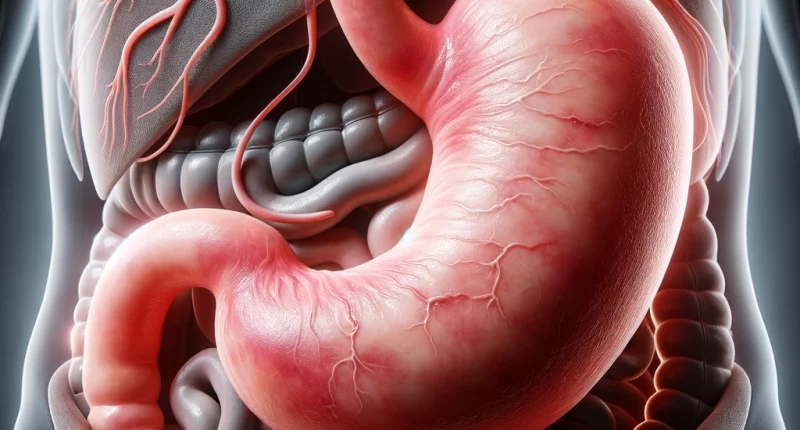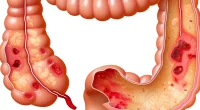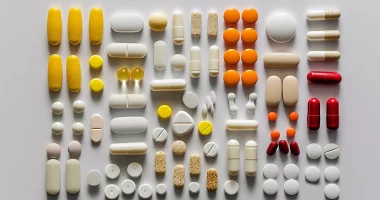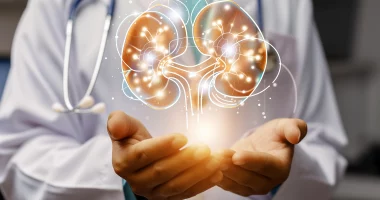Gastric ulcer
What is it?
Gastric ulcer is a chronic pathology characterized by ulcerative lesions in the stomach, propensity to progression, and various complications. This disease is characterized by periods of exacerbations and remissions. The most dangerous condition is bleeding, perforation of the wall, and malignant degeneration of the ulcer.
A peptic ulcer is often caused by H.pylori infection, which causes acute inflammation that quickly develops into a chronic condition, contributing to increased hydrochloric acid production. People over 60 are at particular risk of this bacterium, as well as patients taking several medications that negatively affect the stomach.
Classification
There is no universally accepted classification of peptic ulcer disease. Depending on the presence or absence of H. pylori infection, peptic ulcer disease associated and not associated with H. pylori infection is distinguished. The latter form is sometimes also called idiopathic.
There is also a distinction between ulcers as an independent disease (essential peptic ulcer disease) and symptomatic ulcers of the stomach and duodenum (associated with drug intake, stress, with endocrine pathology, with other chronic diseases of internal organs), which occur against the background of other diseases and the mechanisms of their development are associated with specific etiologic and pathogenetic factors.
Depending on the localization, there are gastric ulcers (cardiac and subcardiac, gastric body, antral, pyloric canal), duodenal ulcers (bulb, postbulbar, and combined gastric and duodenal ulcers. Ulcers may be located on the small or large curvature, anterior and posterior walls of the stomach, and duodenum.
The number of ulcerative lesions distinguishes single and multiple ulcers, and depending on the size of the ulcer defect – ulcers of small (up to 0.5 cm in diameter) and medium (0.6-1.9 cm in diameter) sizes, large (2.0 – 3.0 cm in diameter) and giant (over 3.0 cm in diameter) ulcers.
Symptoms and manifestations of gastric ulcers
The disease runs differently in periods of remission and exacerbations. The signs of gastric and duodenal ulcers are as follows:
- Painful sensations mainly felt on an empty stomach or immediately after a meal.
- Heartburn that does not go away is especially pronounced at night and in the morning.
- Nausea.
- Belching that has a bitter or sour taste.
- Heaviness in the stomach and rapid filling.
- Vomit colored like «coffee grounds» and the appearance of black stools – observed in the appearance of bleeding from ulcers.
- Decreased appetite.
- Very sharp, severe pain in the abdomen or behind the sternum, nausea with vomiting, and pain when tensing the abdominal muscles – such symptoms are characteristic of perforated ulcers.
Causes of gastric ulcers
The leading causes of the disease are stomach infection with Helicobacter pylori bacteria and prolonged use of medications with ulcerogenic effects. Secondary causes of the appearance of the disease include:
- disturbed eating habits;
- stressful situations and severe emotional strain;
- alcohol intake and tobacco smoking;
- hypovitaminosis;
- genetic predisposition to the development of the disease;
- metabolic disorders in the body.
Diagnosis gastric ulcer
The earlier the disease is diagnosed, the higher the probability of successful treatment with conservative methods.
When symptoms of the ailment are detected, it is recommended to perform:
- Esophagogastroduodenoscopy (gastroscopy). This method of diagnosis will help determine the ulcer defect, make a conclusion about its depth and location, and perform tissue sampling for examination (biopsy).
- Radiography or CT scan. Another method of determining if a lesion is pronounced.
- Urease breath test with urea. Blood test. Stool examination. It is necessary to determine the presence of H.Pyloriinfection.
- General and biochemical blood tests. It helps to determine the signs of anemia.
Gastric ulcer treatment
The specific method of treatment is prescribed only by a doctor after diagnosis. If the disease is diagnosed early, successful drug treatment of gastric ulcers is likely. It aims to heal ulcers by taking particular drugs that reduce the acidity of gastric juice and destroy the bacteria Helicobacter pylori. Also, the doctor will recommend a diet generally reduced to refusing products that contribute to the production of gastric juice and irritation of the stomach walls. Also, they must give up fatty, spicy, salty food and replace them with steamed or boiled food.
In case of complications, such as malignant tumor, gatekeeper stenosis, bleeding, or ulcer perforation, surgical treatment of gastric ulcer is prescribed. In this case, the gastric ulcer is removed or sutured, bleeding is stopped, and measures are taken to dilate the digestive tube.
Surgery is also mandatory when a malignant tumor is detected. Treatment can be successful if the tumor has not affected all layers of the stomach and has not spread to neighboring organs. The success of treatment depends directly on early diagnosis of the disease.
All these treatment options are available in more than 620 hospitals worldwide (https://doctor.global/results/diseases/gastric-ulcer). For example, distal gastric resection can be done in 22 clinics across Turkey for an approximate price of $4.8 K (https://doctor.global/results/asia/turkey/all-cities/all-specializations/procedures/distal-gastric-resection).
Surgical treatment
Despite the success of conservative therapy for peptic ulcer disease, 10-15% of patients fail to achieve a permanent remission. It is believed that if 3-4-fold drug treatment in the hospital does not lead to persistent remission, the question of surgical treatment should be raised.
Surgery is also indicated in advanced forms or complicated courses of peptic ulcer disease (ulcer perforation, profuse gastrointestinal bleeding, stenosis, etc.).
Rehabilitation for peptic ulcer disease
A specific method of treatment is prescribed only by a doctor after diagnosis. In the case of diagnosing the disease at an early stage, there is a possibility. Rehabilitation is carried out according to the following program:
- adherence to a specially designed diet as directed by a physician;
- medication;
- annual follow-up for five years since the last exacerbation.
Gastric ulcer prevention
The primary preventive measure is to prevent Helicobacter infection. It is also recommended:
- Periodically perform complete body examinations to detect the disease at an early stage;
- If you have relatives with peptic ulcer disease or if you have been diagnosed with peptic ulcer disease, you should be tested for H.pylori bacteria;
- give up or minimize alcohol intake and smoking;
- lead a healthy lifestyle – stick to a daily routine, give your body physical activity, get enough sleep;
- adhere to a proper diet – avoid fatty, fried foods; minimize the use of salty and spicy foods;
- eliminate stressful situations;
- Improving living standards and choosing better and healthier food choices;
- control the intake of therapeutic drugs and use them only as prescribed by a doctor.
If the gastric ulcer is without complications, then with proper therapy, there is every chance of successful treatment.



